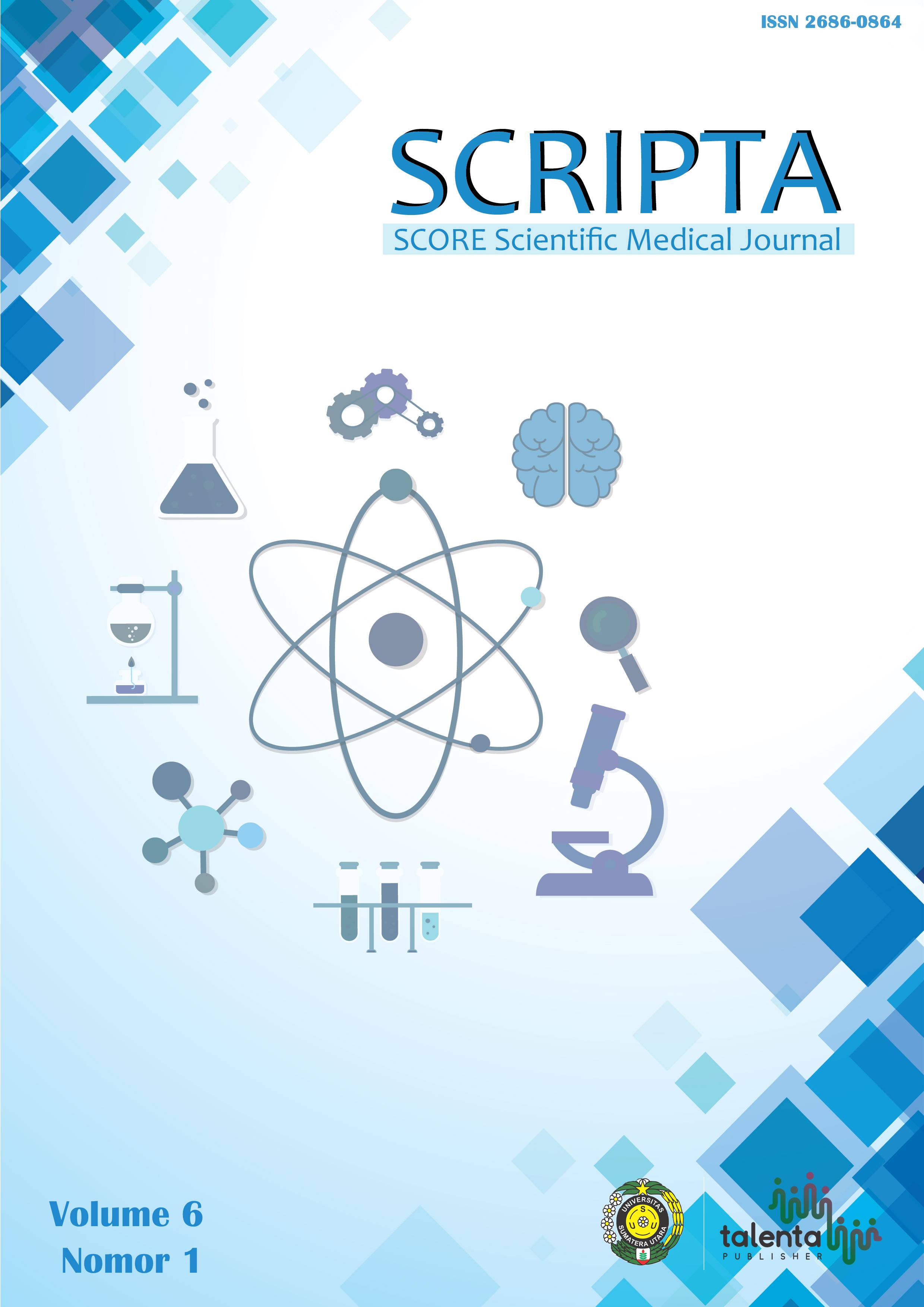Probiotic Supplementation’s Efficacy and Safety in Preventing Healthcare-Associated Infections: A Systematic Review and Meta-Analysis
DOI:
https://doi.org/10.32734/scripta.v6i1.15897Keywords:
Healthcare-Associated Infection, Placebo, Probiotics, Plasebo, ProbiotikAbstract
Background: Infections that people may get while seeking treatment in health facilities are known as healthcare-associated infections (HAIs). The application of probiotics represents a forefront approach in ongoing research and development for the prevention of HAIs. Probiotics' effectiveness has been the subject of several prior research, although the findings have not always been consistent. Objectives: This research aims to determine the efficacy and safety of probiotic supplementation in lowering HAIs when compared to a placebo. Methods: The PRISMA 2020 guidelines were followed in this investigation. Using the keywords "Healthcare-Associated Infections", "Nosocomial Infection, and "Probiotic", a search of the literature was done in July 2023 on the Cochrane Library, Google Scholar, PubMed, Proquest, Science Direct, Springer Link, and the ClinicalTrial.gov registry, with a focus on Randomized Clinical Trials from the previous ten years that compared the efficacy and safety of probiotics and placebos in preventing HAIs. The University of Oxford CEBM sheet, the Cochrane Risk of Bias Tools and Modified Jadad Score were used to evaluate the RCTs included. Meta analysis is carried through using RevMan Software 5.4. Results: Three RCTs that included 542 adult patients were qualified. The patient’s ages varied from 18 to 80, with 304 men (67.26%) and 148 women (32.74%) present. Probiotics significantly reduced HAIs compared to placebo (OR 1.92; 95% CI 1.10-3.35; p=0.02). Probiotics were administered to patients without causing any significant negative effects. Conclusion: In comparison to a placebo, probiotics are effective and safe in lowering the frequency of HAIs.
Latar Belakang: Infeksi yang diperoleh pasien saat berobat ke fasilitas pelayanan kesehatan dikenal sebagai healthcare-associated infections (HAIs). Penggunaan probiotik merupakan pendekatan terdepan dalam penelitian dan pengembangan saat ini untuk upaya pencegahan HAIs. Efektivitas probiotik telah menjadi subjek beberapa penelitian sebelumnya, meskipun temuan yang diperoleh tidak selalu konsisten. Tujuan: Penelitian ini bertujuan untuk mengetahui efikasi dan keamanan suplementasi probiotik dalam menurunkan HAIs jika dibandingkan dengan plasebo. Metode:Penelitian ini mengikuti pedoman PRISMA 2020. Penelusuran literatur dilakukan menggunakan kata kunci “Healthcare-Associated Infectionsâ€,“Nosocomial Infectionâ€, dan “Probiotic†pada bulan Juli 2023 di database Cochrane Library, Google Scholar, PubMed, Proquest, Science Direct, Springer Link, dan ClinicalTrial registri.gov, dengan fokus artikel Randomized Clinical Trials (RCT) terpublikasi sepuluh tahun terakhir yang membandingkan efikasi serta keamanan probiotik dan plasebo dalam mencegah HAIs. Lembar The University of Oxford CEBM, instrumen deteksi risiko bias Cochrane, dan skor Jadad yang dimodifikasi digunakan untuk mengevaluasi artikel RCT terpilih. Meta Analisis dilakukan dengan menggunakan Software RevMan versi 5.4. Hasil: Tiga artikel RCT yang mencakup sebanyak 542 pasien dewasa memenuhi syarat untuk disertakan dalam penelitian. Usia pasien bervariasi dari 18 hingga 80 tahun, terdiri dari 304 pria (67,26%) dan 148 wanita (32,74%). Probiotik secara signifikan mengurangi HAIs dibandingkan dengan plasebo (OR 1.92; 95% CI 1.10-3.35; p=0.02). Probiotik diberikan kepada pasien tanpa menimbulkan efek negatif yang signifikan Kesimpulan: Dibandingkan dengan plasebo, probiotik efektif dan aman dalam menurunkan frekuensi HAIs.
Downloads
Downloads
Published
How to Cite
Issue
Section
License
Copyright (c) 2024 Fauzi Satria, Tri Widyawati, Monica Dwi Jalma

This work is licensed under a Creative Commons Attribution-NonCommercial 4.0 International License.
Authors who publish with SCRIPTA SCORE Scientific Medical Journal agree to the following terms:
- Authors retain copyright and grant SCRIPTA SCORE Scientific Medical Journal right of first publication with the work simultaneously licensed under a Creative Commons Attribution-NonCommercial License that allows others to remix, adapt, build upon the work non-commercially with an acknowledgment of the work’s authorship and initial publication in SCRIPTA SCORE Scientific Medical Journal.
- Authors are permitted to copy and redistribute the journal's published version of the work non-commercially (e.g., post it to an institutional repository or publish it in a book), with an acknowledgment of its initial publication in SCRIPTA SCORE Scientific Medical Journal.














